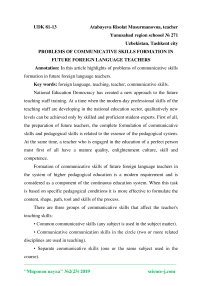Problems of communicative skills formation in future foreign language teachers
Автор: Atabayeva R.M.
Журнал: Мировая наука @science-j
Рубрика: Основной раздел
Статья в выпуске: 2 (23), 2019 года.
Бесплатный доступ
In this article highlights of problems of communicative skills formation in future foreign language teachers.
Foreign language, teaching, teacher, communicative skills
Короткий адрес: https://sciup.org/140264265
IDR: 140264265 | УДК: 81-13
Текст научной статьи Problems of communicative skills formation in future foreign language teachers
National Education Democracy has created a new approach to the future teaching staff training. At a time when the modern-day professional skills of the teaching staff are developing in the national education sector, qualitatively new levels can be achieved only by skilled and proficient student-experts. First of all, the preparation of future teachers, the complete formulation of communicative skills and pedagogical skills is related to the essence of the pedagogical system. At the same time, a teacher who is engaged in the education of a perfect person must first of all have a mature quality, enlightenment culture, skill and competence.
Formation of communicative skills of future foreign language teachers in the system of higher pedagogical education is a modern requirement and is considered as a component of the continuous education system. When this task is based on specific pedagogical conditions it is more effective to formulate the content, shape, path, tool and skills of the process.
There are three groups of communicative skills that affect the teacher's teaching skills:
-
• Common communicative skills (any subject is used in the subject matter).
-
• Communicative communication skills in the circle (two or more related disciplines are used in teaching).
-
• Separate communicative skills (one or the same subject used in the course).
In language learning, there is a specific backlog of knowledge that can be a technological basis for some communicative skills. The basis of these resources is achieved through the acquisition of pedagogical skills. All skills and abilities can be divided into two groups:
-
1. Skills and skills related to the use of language tools in communication. This group includes all the skills and skill in the field of lectures, grammar, phonetics, and spelling.
-
2. Special abilities and skills that provide specific types of speech.
Each of the abovementioned speaking skills and qualifications has specific features. That's why the future foreign language teachers use exercises that can provide communication skills and skill. These exercises can be divided into two types:
-
- exercises designed to develop skills and abilities to use language tools (such exercises can be called linguistic exercises).
-
- speech exercises
The success of the exercise depends on how the practitioner aims to improve the quality of the action, the way to get the right things done, the achievements that are achieved, and the reasons for the mistakes made, the reasons for their elimination.
As you know, the essence of learning foreign languages is to enter the spiritual world of other peoples, to observe their strong and illustrious aspects, to look at their mother tongue out of a respectful language.
In this regard, the factors that make the impact of the person's communication more indifferent to each foreign language teacher are as follows: personal independence;
urbanization; urbanization;
mass communication;
information (information) explosion;
alienation
Knowing these factors will help future foreign language teachers to avoid any difficulties that arise in their relationship with their students. Factors include the attitude of the instructor to the attitudes needed to communicate with his or her own students, the theme, the situation, the purpose (communicative task) and the choice of communication. The foreign language learning curriculum for students of foreign languages is based on a system of communicative skills formation in a general form (skills required for all subjects and lessons), a narrow circle (skills required for the activity of students in multiple subjects), and specific skills required). This requires the development of an exercise kit for linguistic communicative skills for foreign language teachers.
-
1) Theoretical conclusions;
-
2) Attempts to imitate existing samples;
-
3) Examples of the existing sampling;
-
4) Exercises for logical conclusions.
If the above exercise is a form of communication, the principles of psychological correction are the essence of communication.
Список литературы Problems of communicative skills formation in future foreign language teachers
- 1.Gabunia Z. M., Ulimbasheva E. Yu. Intercultural communication as a world-building fact of the language: study guide for the special course "Intercultural communication". - Nalchik, 2005.
- 2.Karasev S. A. The globalization of the English language and the new tasks of its teaching methods // Language and intercultural communication. Materials of the interuniversity scientific-practical conference. - Rostov-on-Don: Publishing house IUBiP. - 2005.


